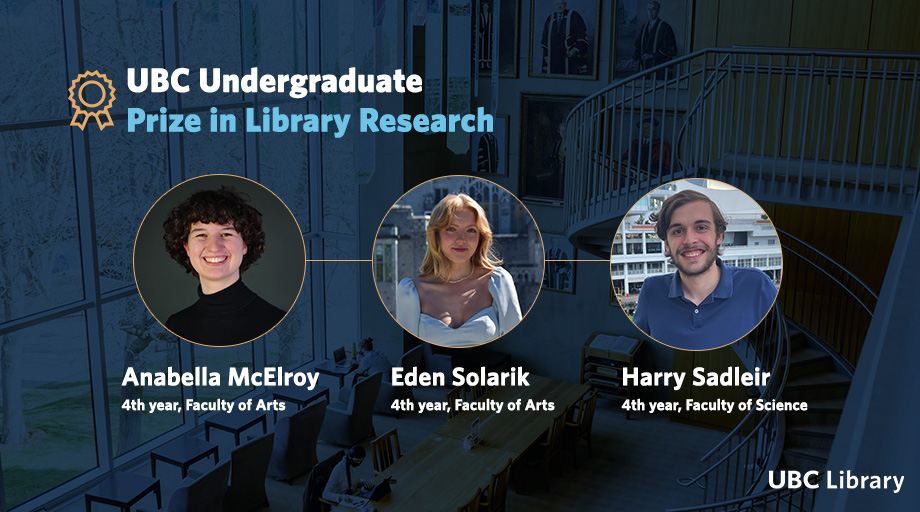
About the prize
The UBC Undergraduate Prize in Library Research is a way to showcase students’ effective and innovative use of library services, information experts and resources provided by the UBC Library. Applications for these prizes also provide students with an opportunity to reflect on their information-seeking experience, showcase their research beyond the classroom, and promote scholarship excellence at the undergraduate level at the University of British Columbia.
The Prize was established by UBC Library to encourage more and deeper use of its resources and collections, to advance information literacy at UBC, and to promote academic excellence at UBC.
Q: Could you tell us a little bit about your project?
Anabella McElroy response:
Our project was a ‘reverse engineering’ of UBC’s faculty divisions. We looked into how and why UBC is divided the way it is, and what that means for students and researchers.
I led the archival research for the project, which meant looking through select President’s Reports, Academic Calendars and UBC Senate meeting minutes going back to UBC’s first session in 1915. One interesting fact I found in that process was that UBC had a faculty of Arts and Science until 1963. It was split in two because of the faculty’s size — at its peak 50% of student enrollment — but many faculty members couldn’t be so easily placed in Arts or Science.
That lead to both B.A. and B.Sc. options being offered in subjects like math – which means students to this day with the same major might have entirely different academic contexts for their work by nature of their degree requirements.
Eden Solarik response:
Our project was called “UBC: How We Are Organized”, and we focused on how the organization of the university impacts students, staff, and faculty today. My focus on the project was on how the structural arrangement impacts the creation and distribution of knowledge on our campus, thanks to opportunities for inter- and cross-faculty collaboration that are shaped by university structure.
Harry Sadleir response:
Our project was for INFO 200: Foundations of Informatics. We chose to research historically why and how UBC is split up into its faculties and departments, and how that affects students today. My role in the project was to take the data we found in our research and to create visualizations that conveyed the points in our presentation and paper. This really felt like a great way to bring some of my specialties as a computer science student to an arts project, and we were all very happy with the results.
Q: What does winning this prize mean to you?
Anabella McElroy response:
I hadn’t done this sort of historical research for a project before, but I really enjoyed the process and it’s an honour to be recognized for it. It also feels like a full circle moment that this award for thinking critically about our own knowledge production was awarded for an information studies class (INFO 200), in which how we gain knowledge was a major focus.
Eden Solarik response:
First of all, I want to thank Dr. Hannah Turner, our professor for this project, as we applied thanks to her support and encouragement. I’m really proud of the collaborative work we did on this project, especially considering our diverse backgrounds of computer science, political science, and philosophy. I think that we’re a living example of one point that our project was trying to make—that programs that encourage cross-faculty collaboration can produce unique and relevant work. Winning this prize reinforces this idea.
Harry Sadleir response:
The fact that it is a group project is part of why it feels so great to be recognized with this prize, since we get to celebrate our work together. Collaboration can be hard at times, especially in the context of course projects, but this is a great reminder that it really can produce great results.
Q: What are your plans for the future?
Anabella McElroy response:
I’ve still got a year left at UBC, so first finish my political science degree! After graduating I hope to take my research experience from university into public policy work.
Eden Solarik response:
Next year I’m finishing up my dual degree with UBC and Sciences Po, and completing my requirements for my minor in informatics. My fall will be dedicated in large part to applying to law school and grad school, as I’m interested in working in the intersection of law, technology, and policy in the future.
Harry Sadleir response:
I have one more year of my Bachelor of Science degree left, after which I plan on working as a software developer. Wherever I end up I hope that research will be a part of my career!
Q: Do you have a favourite research spot at UBC Library?
Anabella McElroy response:
The Musqueam Reading Room in IKBLC is an ideal research spot for me – it’s quiet and has lots of natural light.
Eden Solarik response:
When I want a quiet place to research, my favourite spot is the top floor of the Ridington room in the MAA—something about all of the paintings of old men really puts me in the mood to study. I also love the view from the tables on the third floor of Koerner facing IKBLC, especially on a sunny day! If I’m pulling a late-night study sesh, I’ll hunker down in the Musqueam reading room.
Harry Sadleir response:
I like the 4th floor at Koerner Library. It’s a nice central location and not typically as busy as IKBLC.